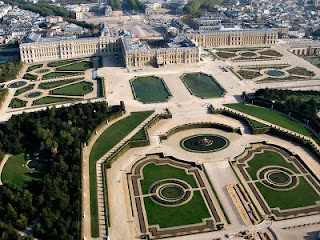Il secolo dell’Assolutismo
Il Seicento è anche il secolo in cui si afferma un modo di governare chiamato assolutismo .
Questo ebbe particolare successo in Francia, sotto il regno di re Luigi XIV , dello il Re Sole .
Luigi XIV
Re Luigi voleva eliminare ogni limite alla sua autorità e, per conseguire questo obiettivo, cercò di eliminare diverse antiche tradizioni.
Un limite al potere del re era rappresentato dalle Assemblee degli Stati Generali (1° Stato = clero; 2° Stato = aristocrazia; 3° Stato = cittadini, professionisti…). Gli Stati Generali avevano il compito di esaminare le leggi esaminate dal sovrano . Se le ritenevano ingiuste o dannose potevano criticarle e ritardare la loro entrata in vigore.
Luigi XIV stabilì che i Parlamenti erano obbligati ad approvare le decisioni del re . Al limite, dopo averle approvate potevano esprimere delle lamentele, comunque inutili, perché il re non era tenuto a prestarvi ascolto.
Il Re Sole divise
The stewards were responsible for enforce laws, collect taxes to and administer justice. In this way the king could exercise its power even in the remotest provinces of France.
The Sun King also understood that to maintain balance his power was necessary to strictly control the nobility . Louis XIV did not trust it at all of the nobles, who several times during the '600 had staged revolts against the kings of France.

The Palace of Versailles
a very serious act committed by King Louis XIV in 1685, was the withdrawal (withdrawal, cancellation) dell’ Editto di Nantes , proclamato, come abbiamo già visto, da suo nonno, Enrico IV (vedi sopra). Il re, che era cattolico, non voleva che esistesse nel suo regno il diritto a praticare religioni diverse dalla sua. In questa maniera circa 200.000 ugonotti, a cui non era più permesso praticare la propria religione, fuggirono dalla Francia verso i Paesi protestanti: per il Paese fu un grave danno, perché tra gli ugonotti vi erano molti banchieri, imprenditori e commercianti abili e ricchi.
Il re Sole desiderava fare della Francia il Paese più potente d’Europa. Per far questo era necessario creare un grande esercito . E così fece: tra il 1664 e il 1703 l’esercito francese passò dai 45.000 soldati ai 400.000, il più grande d’Europa. E nemmeno Luigi aveva intenzione di lasciare i suoi soldati con le mani in mano: dei 54 anni del suo regno, ben 37 furono segnati da guerre! Se in un primo momento
Altri sovrani absolute
Other European monarchs tried to imitate, with varying degrees of fortune, the model of the Sun King's watchwords were:
- create a strong army well-trained professionals.
- Create a bureaucracy efficient and reliable, as the stewards of the French, so that the taxes were paid and respected the king's orders.
- Limit privileges and the power of the nobles and clergy .
These attempts were unsuccessful in Prussia and Russia .
Much more unfortunate was the attempt of the King ' England, Charles I . Even in this country, the king, before Louis XIV, sought to limit the power of the assemblies, which here is called parliaments, and had a different composition than in the French general.
I parliaments in England were much stronger than in France and managed to firmly oppose the intentions of the king to rule without consulting them. From this confrontation came in 1641 , a violent civil war also assumed that religious characteristics. Charles I was a supporter of the Anglican, while the rebels, led by Oliver Cromwell , were mostly Puritans (the English version of Calvinism).

Oliver Cromwell
Cromwell era un abilissimo comandante militare e il suo esercito riuscì a sconfiggere quello del re che fu imprigionato e condannato a morte nel 1649 .

 La decapitazione di Carlo I Stuart
La decapitazione di Carlo I Stuart
Nel Paese fu proclamata
James attempted to govern without Parliament because he regarded his own power ILIMIT, absolute. Parliament judged unacceptable behavior of the king and, in 1688, he decided to oust him. He was called to help the staolder (Head of State) Dutch William III of Orange, husband of the daughter of James II, Mary Stuart . The
stadtholder landed in England with his army, but on his arrival the king had already fled: the Parliament was able to get rid of the supernatural without shedding a drop of blood, so the event buckets called Glorious Revolution.

The House of Commons,
one of the two Houses of Parliament English
William and Mary were proclaimed sovereign, but before being crowned had to swear to respect the
In questo documento si diceva che l’assemblea parlamentare aveva il diritto di:
- approvare o respingere le nuove tasse proposte dal re
- fare le leggi ( potere legislativo )
Inoltre i sovrani dvevano garantire ai sudditi alcuni diritti fondamentali:
- il diritto di non essere arrestati arbitrariamente ( libertà personale )
- il diritto di dire e pubblicare il proprio parere senza essere puniti ( libertà d'espressione e di stampa )
- la libertà di religione (che però non valeva per i cattolici)
Era nato uno Stato di tipo nuovo , unico in Europa: il re governava insieme al Parlamento che rappresentava il popolo inglese e limitava il potere del re.
In realtà solo i sudditi più rich had the right to elect their members of Parliament.
He had deleted the old idea that the King derived his powers from God and therefore had the right to rule without limits. From that moment he began to argue that the king received the right to govern by his subjects and therefore should be accountable to them.

0 comments:
Post a Comment